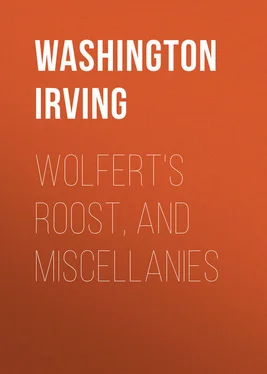Washington Irving - Wolfert's Roost, and Miscellanies
Здесь есть возможность читать онлайн «Washington Irving - Wolfert's Roost, and Miscellanies» — ознакомительный отрывок электронной книги совершенно бесплатно, а после прочтения отрывка купить полную версию. В некоторых случаях можно слушать аудио, скачать через торрент в формате fb2 и присутствует краткое содержание. Издательство: Иностранный паблик, Жанр: foreign_antique, foreign_prose, на английском языке. Описание произведения, (предисловие) а так же отзывы посетителей доступны на портале библиотеки ЛибКат.
- Название:Wolfert's Roost, and Miscellanies
- Автор:
- Издательство:Иностранный паблик
- Жанр:
- Год:неизвестен
- ISBN:нет данных
- Рейтинг книги:4 / 5. Голосов: 1
-
Избранное:Добавить в избранное
- Отзывы:
-
Ваша оценка:
- 80
- 1
- 2
- 3
- 4
- 5
Wolfert's Roost, and Miscellanies: краткое содержание, описание и аннотация
Предлагаем к чтению аннотацию, описание, краткое содержание или предисловие (зависит от того, что написал сам автор книги «Wolfert's Roost, and Miscellanies»). Если вы не нашли необходимую информацию о книге — напишите в комментариях, мы постараемся отыскать её.
Wolfert's Roost, and Miscellanies — читать онлайн ознакомительный отрывок
Ниже представлен текст книги, разбитый по страницам. Система сохранения места последней прочитанной страницы, позволяет с удобством читать онлайн бесплатно книгу «Wolfert's Roost, and Miscellanies», без необходимости каждый раз заново искать на чём Вы остановились. Поставьте закладку, и сможете в любой момент перейти на страницу, на которой закончили чтение.
Интервал:
Закладка:
How far Master Hendrick Hudson and his worthy mate carried their experiment with the sachem's wife is not recorded, neither does the curious Robert Juet make any mention of the after-consequences of this grand moral test; tradition, however, affirms that the sachem on landing gave his modest spouse a hearty rib-roasting, according to the connubial discipline of the aboriginals; it farther affirms that he remained a hard drinker to the day of his death, trading away all his lands, acre by acre, for aqua vitae; by which means the Roost and all its domains, from Yonkers to Sleepy Hollow, came, in the regular course of trade and by right of purchase, into the possession of the Dutchmen.
Never has a territorial right in these new countries been more legitimately and tradefully established; yet, I grieve to say, the worthy government of the New Netherlands was not suffered to enjoy this grand acquisition unmolested; for, in the year 1654, the local Yankees of Connecticut – those swapping, bargaining, squatting enemies of the Manhattoes – made a daring inroad into this neighborhood and founded a colony called Westchester, or, as the ancient Dutch records term it, Vest Dorp, in the right of one Thomas Pell, who pretended to have purchased the whole surrounding country of the Indians, and stood ready to argue their claims before any tribunal of Christendom.
This happened during the chivalrous reign of Peter Stuyvesant, and it roused the ire of that gunpowder old hero; who, without waiting to discuss claims and titles, pounced at once upon the nest of nefarious squatters, carried off twenty-five of them in chains to the Manhattoes, nor did he stay his hand, nor give rest to his wooden leg, until he had driven every Yankee back into the bounds of Connecticut, or obliged him to acknowledge allegiance to their High Mightinesses. He then established certain out-posts, far in the Indian country, to keep an eye over these debateable lands; one of these border-holds was the Roost, being accessible from New Amsterdam by water, and easily kept supplied. The Yankees, however, had too great a hankering after this delectable region to give it up entirely. Some remained and swore allegiance to the Manhattoes; but, while they kept this open semblance of fealty, they went to work secretly and vigorously to intermarry and multiply, and by these nefarious means, artfully propagated themselves into possession of a wide tract of those open, arable parts of Westchester county, lying along the Sound, where their descendants may be found at the present day; while the mountainous regions along the Hudson, with the valleys of the Neperan and the Pocantico, are tenaciously held by the lineal descendants of the Copperheads.
The chronicle of the venerable Diedrich here goes on to relate how that, shortly after the above-mentioned events, the whole province of the New Netherlands 'was subjugated by the British; how that Wolfert Acker, one of the wrangling councillors of Peter Stuyvesant, retired in dudgeon to this fastness in the wilderness, determining to enjoy "lust in rust" for the remainder of his days, whence the place first received its name of Wolfert's Roost. As these and sundry other matters have been laid before the public in a preceding article, I shall pass them over, and resume the chronicle where it treats of matters not hitherto recorded:
Like many men who retire from a worrying world, says DIEDRICH KNICKERBOCKER, to enjoy quiet in the country, Wolfert Acker soon found himself up to the ears in trouble. He had a termagant wife at home, and there was what is profanely called "the deuce to pay," abroad. The recent irruption of the Yankees into the bounds of the New Netherlands, had left behind it a doleful pestilence, such as is apt to follow the steps of invading armies. This was the deadly plague of witchcraft, which had long been prevalent to the eastward. The malady broke out at Vest Dorp, and threatened to spread throughout the country. The Dutch burghers along the Hudson, from Yonkers to Sleepy Hollow, hastened to nail horseshoes to their doors, which have ever been found of sovereign virtue to repel this awful visitation. This is the origin of the horse-shoes which may still be seen nailed to the doors of barns and farmhouses, in various parts of this sage and sober-thoughted region.
The evil, however, bore hard upon the Roost; partly, perhaps, from its having in old times been subject to supernatural influences, during the sway of the Wizard Sachem; but it has always, in fact, been considered a fated mansion. The unlucky Wolfert had no rest day nor night. When the weather was quiet all over the country, the wind would howl and whistle round his roof; witches would ride and whirl upon his weathercocks, and scream down his chimneys. His cows gave bloody milk, and his horses broke bounds, and scampered into the woods. There were not wanting evil tongues to whisper that Wolfert's termagant wife had some tampering with the enemy; and that she even attended a witches' Sabbath in Sleepy Hollow; nay, a neighbor, who lived hard by, declared that he saw her harnessing a rampant broom-stick, and about to ride to the meeting; though others presume it was merely flourished in the course of one of her curtain lectures, to give energy and emphasis to a period. Certain it is, that Wolfert Acker nailed a horse-shoe to the front door, during one of her nocturnal excursions, to prevent her return; but as she re-entered the house without any difficulty, it is probable she was not so much of a witch as she was represented. 4 4 HISTORICAL NOTE. – The annexed extracts from the early colonial records, relate to the irruption of witchcraft into Westchester county, as mentioned in the chronicle: "JULY 7, 1670. – Katharine Harryson, accused of witchcraft on complaint of Thomas Hunt and Edward Waters, in behalf of the town, who pray that she may be driven from the town of Westchester. The woman appears before the council… She was a native of England, and had lived a year in Weathersfield, Connecticut, where she had been tried for witchcraft, found guilty by the jury, acquitted by the bench, and released out of prison, upon condition she would remove. Affair adjourned. "AUGUST 24. – Affair taken up again, when, being heard at large, it was referred to the general court of assize. Woman ordered to give security for good behavior," etc. In another place is the following entry: "Order given for Katharine Harryson, charged with witchcraft, to leave Westchester, as the inhabitants are uneasy at her residing there, and she is ordered to go off."
After the time of Wolfert Acker, a long interval elapses, about which but little is known. It is hoped, however, that the antiquarian researches so diligently making in every part of this new country, may yet throw some light upon what may be termed the Dark Ages of the Roost.
The next period at which we find this venerable and eventful pile rising to importance, and resuming its old belligerent character, is during the revolutionary war. It was at that time owned by Jacob Van Tassel, or Van Texel, as the name was originally spelled, after the place in Holland which gave birth to this heroic line. He was strong-built, long-limbed, and as stout in soul as in body; a fit successor to the warrior sachem of yore, and, like him, delighting in extravagant enterprises and hardy deeds of arms. But, before I enter upon the exploits of this worthy cock of the Boost, it is fitting I should throw some light upon the state of the mansion, and of the surrounding country, at the time.
The situation of the Roost is in the very heart of what was the debateable ground between the American and British lines, during the war. The British held possession of the city of New York, and the island of Manhattan on which it stands. The Americans drew up toward the Highlands, holding their headquarters at Peekskill. The intervening country, from Croton River to Spiting Devil Creek, was the debateable land, subject to be harried by friend and foe, like the Scottish borders of yore. It is a rugged country, with a line of rocky hills extending through it, like a back bone, sending ribs on either side; but among these rude hills are beautiful winding valleys, like those watered by the Pocantico and the Neperan. In the fastnesses of these hills, and along these valleys, exist a race of hard-headed, hard-handed, stout-hearted Dutchmen, descendants of the primitive Nederlanders. Most of these were strong whigs throughout the war, and have ever remained obstinately attached to the soil, and neither to be fought nor bought out of their paternal acres. Others were tories, and adherents to the old kingly rule; some of whom took refuge within the British lines, joined the royal bands of refugees, a name odious to the American ear, and occasionally returned to harass their ancient neighbors.
Читать дальшеИнтервал:
Закладка:
Похожие книги на «Wolfert's Roost, and Miscellanies»
Представляем Вашему вниманию похожие книги на «Wolfert's Roost, and Miscellanies» списком для выбора. Мы отобрали схожую по названию и смыслу литературу в надежде предоставить читателям больше вариантов отыскать новые, интересные, ещё непрочитанные произведения.
Обсуждение, отзывы о книге «Wolfert's Roost, and Miscellanies» и просто собственные мнения читателей. Оставьте ваши комментарии, напишите, что Вы думаете о произведении, его смысле или главных героях. Укажите что конкретно понравилось, а что нет, и почему Вы так считаете.












